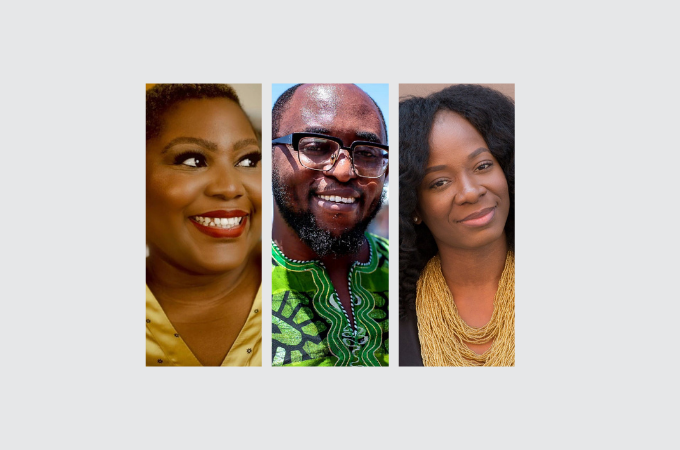
Spoken word poetry is a breathing, embodied, multi-vocal art form, kindling an unbounded energy in Nigerian literary culture and fostering a community of veterans, newcomers, and enthusiasts across Africa and the world.
Notwithstanding, while much attention has been paid to conventional poetry, that is, written poetry and its practitioners, spoken word poetry has received far less critical attention. This interview engages three leading spoken word poets on the evolution of the form and its impact on literary culture.
Titilope Sonuga, Wana Udobang, and Efe Paul Azino have performed in Africa, Asia, Europe, and North America, to much acclaim. Their work eloquently touches on a confluence of themes many Nigerians can relate to, reflecting these poets’ commitment to creativity and community. Together, they mobilize poetry to engage the urgency of the times they live in. They have collaborated in several projects, creating numerous opportunities for fellow and aspiring poets across the continent.
In this roundtable, Sonuga, Udobang, and Azino share their insights into spoken word poetry with Uchechukwu Peter Umezurike, Vanier scholar and doctoral student in the English and Film Studies department at the University of Alberta, Canada.
Uchechukwu
I’d like to start by commending you – Titilope, Efe, and Wana, for all the amazing work you have been doing for Nigerian poetry. I see your work as an intervention in a cultural landscape that needs revitalizing. If you were to define spoken word poetry, what would you say it is?
Titilope
Thank you so much, Uche. Spoken word poetry is simply poetry that is spoken. The “how” and “what” of that depends on who is doing the speaking, I guess.
Efe
Spoken word poetry is poetry and everything poetry is, with the slight distinction of working through a different medium, for the ear, from the stage, a distinction that is only necessary because we insist on defining poetry through textual forms.
Wana
I would consider spoken word to be poems that are performed.
Uchechukwu
Tell us about your creative practices, Wana. Which qualities does one need to be a spoken word poet?
Wana
I think my creative practices revolve around consuming as much art and storytelling as possible. I find poetry in everything from fiction, film, music to even the architecture of a space. Journaling and freewriting have become recent rituals to help open me up to thoughts, memories, stories, and ideas. The qualities, I think, are relative as poets evolve and decide the kinds of work they want to put into the world. But if I have to, I think studying poetry and poems will be a necessary component and so is understanding performance as an art form as well. Understanding the body and the voice as a kind of vocabulary, but consequently what kind of performer you would like to be.
Uchechukwu
The body as a kind of vocabulary, that’s a fascinating phrase. Efe, is there anything you can add to what Wana has said?
Efe
“Do not avert your eyes.” There is an aliveness to the interior and exterior worlds of the poet, rendered effectively in language, that I believe contributes to how well a poet connects. The ability to convey the same emotional honesty that gives a poem its power, to a live audience, even when you don’t feel confident, is something most really good spoken word poets possess. And then there is the brutal thing of trying. Finding what works and what does not. The lifelong practice of creating and falling just a little short, of opening yourself up to the multiple ways language is being used and has been used across time and cultures. If there’s anything that comes close to a creative practice for me it’s this: Listening to myself and to the world around me. Reading and reading. Trying and trying. Again and again.
Uchechukwu
And you, Titilope?
Titilope
I first fell in love with the words on a page. I discovered the art of the spoken word later and it opened up a whole new world to me. My creative practice is at the intersection of these two loves. The puzzle making/world building of the words on the page and the musicality of saying them out loud and discovering what that call and response with the audience does to the work. The qualities to be a spoken word poet I think are the same for being any kind of artist: passion for the work, a hunger to learn and a willingness to put in endless hours to refine.
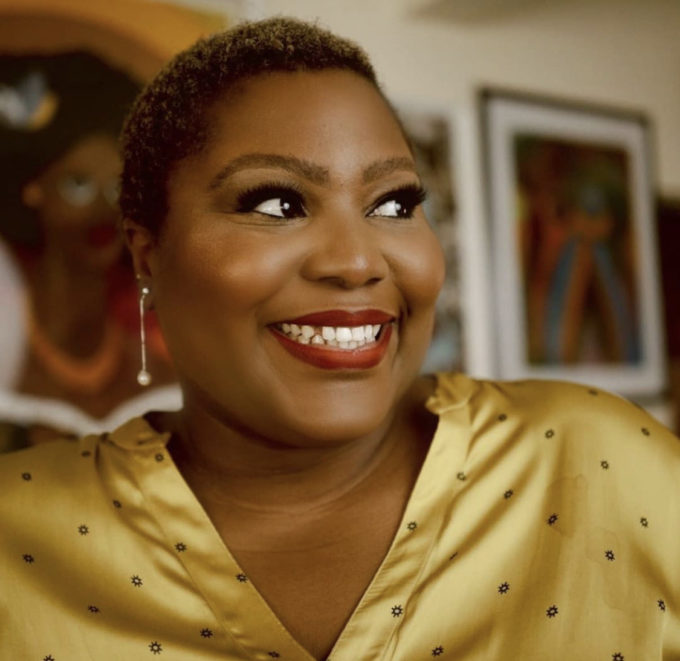
Uchechukwu
What elements of language do you pay attention to in crafting a poem for performance? Why are they important to your poetics?
Efe
Clarity. A listener, in most cases, does not have the luxury of holding the poem and turning it over for meaning. It has to work at first contact, has to linger. This puts a great demand on the structural integrity of the poem. So in writing for performance, I try to be as clear as possible. And this requires economy. Finding the right words in the right order. Knowing how to enter the poem and how to exit, the consciousness of sound that takes the audience on that journey with you. It is seductive to not want to be particular about editing when writing for performance, to rely on physical presence and voice. But it shows you up eventually. I like to think the poem is 80% of the performance.
Titilope
There is something that I can only describe as spiritual that happens in the performance of a poem. It feels like part prayer, part communion. I carry that intention into what I call a performance edit of a poem. How does it sound out loud? What sort of meditative hum is a string of words creating? What could this poem now do without, now that my body, face, and voice are in the room with it? It is important to me for the work to be accessible the first time; the audience does not have the benefit of reading and re-reading the poem on the page.
Wana
I generally don’t think of them as individual things. I am generally writing a poem and I suppose when it is being performed there is an organic transformation that takes place in that process of transference from page to body. For me the storytelling is important, I also feel like words have a sensation. I can feel, taste and hear them. How those are arranged, the images they conjure elicit feelings. Emotional resonance is important for me. I remember things from visceral feelings and I want to leave people with that. I think I am always in search of creating work that also moves me as much as the audience.
Uchechukwu
Spoken word is an embodied performance, and your performances are different. How do you decide on making each performance authentic – voice, rhythm, and stylistics?
Titilope
As long as I can stand behind the truth of the poem, the rest of the work is allowing myself to be present in that moment, to bring into my performance, my voice, my body, what that specific moment calls for.
Efe
I think when it comes to voice, rhythm and stylistics, the poem defines its shape. Its pacing and its contours stretch and fill out in its attempts at meaning. And I believe each poem is rendered authentic by my experience of the emotions I am trying to translate. My telling of an event, all things (craft) being equal, is as unique as what I feel when I experience it. My ability to capture that emotional truth per poem, in my view, is what makes each performance authentic.
Wana
I don’t know that this is something I think about in very formal terms and I don’t know that I want to either. Performance for me is being present, being in the space and being held in the energy of that audience. I have found there are moments I am moved to be hard and loud and there are moments I am moved to be softer and still. Sometimes there is a cosmic direction of the kind of performance that is required of me in that moment and other times the space and energy determine the experience. The one thing I do know is that my voice and body are instruments in that moment and they amalgamate with the words in composing a piece of performance.
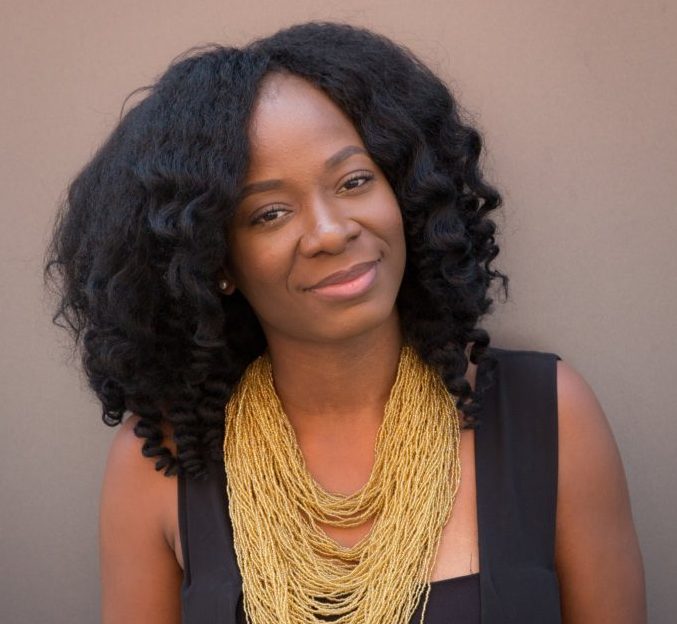
Uchehcukwu
Efe, do you write a poem with a particular audience in mind? Is the audience secondary for you or does it go together with the writing process?
Efe
I think it depends on who or what is calling the poem forth. Sometimes it’s money, a commissioned piece, for example, that requires you to write to a specific theme directed at a specific audience. Other times an idea possesses you and because it’s often a human concern, the resulting poem creates or finds its audience. In this case, the audience is secondary for me, and in the former, it goes together with the writing process.
Uchechukwu
And what about you Titilope and Wana?
Titilope
My main focus when I am writing is to dig my way to the truth on the other side. In that sense, it will resonate with any audience. And if it doesn’t, that too is its own truth.
Wana
I don’t think of an audience at all. I think that would be too much of a distraction and just doesn’t work for me. Unless of course I feel some kind of divine imposition to create work as a message or gift to people. Even when that happens I often find the gift of that work is really mine first. If the work is not commissioned, then I am writing poems that are important and necessary for me.
Uchechukwu
Spoken word is an art I’ve been afraid to explore. So tell me, Wana, what do you think your audience relates to when you are performing on stage? Is the quality specific to a particular audience or commonly shared, regardless of the range of audience? I’d also be interested to hear
what you have to say about those questions, Titilope and Efe.
Wana
I think different people connect to different things, which is the joy of creating and experiencing creativity. From general feedback, I think those that enjoy the work find intersections and connecting points with their own lives and for those that don’t find that connection they find something to enjoy or a feeling that sits with them. Live performance is ephemeral and so I think it requires anyone partaking in the experience to be present and in the moment. That demands your attention as a viewer.
Titilope
I think audiences the world over respond when they see an artist in the fullness of who they really are. I think that is what they recognize, another human being having a fully human experience along with them.
Efe
I think it’s the poem, and this cuts across board. Entertainment, enlightenment, whatever brings people and poet together can only be served by the poem. No quality, depth or volume of theatrics can redeem a performance if there is no value to be found in what is being said.
Uchechukwu
Efe, I’d be interested to hear you say something about how spoken word started in Nigeria, considering that you’ve performed poetry for a decade or more. Why was spoken word poetry not popular before now?
Efe
Contemporary spoken word started becoming a thing in Nigeria circa 2008, a confluence of poets who had been writing and performing in silos, the beginnings of social media (Facebook) and the first wave of cultural workers who created the first open mic scene in Lagos. Special mention to Victor and Funmi Okigbo who created Anthill, one of the first and most vibrant open mic events that provided a platform for the city’s poets and alternative artists, the Jahman Anikulapo and Goethe Institut organized Word Slam, Lydia Idakula’s Taruwa, etc. Facebook made it easy to advertize these events to a community that had already began to form online and brought a sizeable number of poets and audiences together for the first time. Post-event pictures, reports and word of mouth inspired more poets to the fore, more cultural workers jumped into the fray, attracted a bit more capital and the scene more or less grew out of that.
Uchechukwu
Wana, would you like to go ahead after Titilope?
Wana
That’s okay, Uche.
Titilope
Thanks, Wana. What is considered popular really depends on where you are looking, how deeply and how far back. Spoken word /oral poetry is woven into our history, into our traditions across ethnicities. Each generation of poets has simply borrowed from that orality (even when writing for the page) and brought to it what was most urgent in their time. It belongs just as much to the town criers, the orators of our oríkì, as it does to the preachers and the mu’azzin. It is in how we make prayer, how me mourn our dead. It belongs just as much to the poets who gathered at the Anthill in Nsukka, the Ibadan Poetry Club, as it does to the ones at Bogobiri House. It belongs just as much to the greats, the elders, as it does to the young poets trying to push through the noise to find themselves. There isn’t, for me, one singular moment when it began but a constant rebirth that moves through generations. Placing the art form within this larger context allows us to remember that it is not a new trend that relies on popularity.
Wana
A lot of my work has revolved around memory and more recently, I have been exploring reimagination in my work. I think as you evolve, so do the themes in the work. I am becoming increasingly interested in how memory can become a foundation for reimagination.
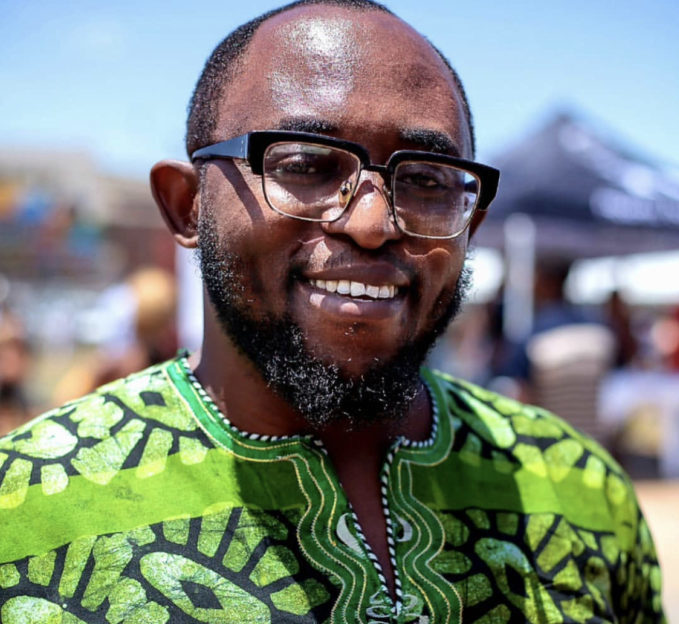
Uchechukwu
Meanwhile, spoken word poetry, as we know it today, has its roots in the United States, and it initially dealt with questions of race and identity. What concerns have been of primary interest to any of you in your poetics, and have these concerns changed over the years?
Titilope
Spoken word poetry, for me, has deep roots in West African oral traditions. Slam poetry, the competitive performance element, has American roots and does fall within the umbrella of spoken word poetry. Also, for a lot of spoken word poets, the wildly popular Def Poetry was the first time we saw this contemporary approach to poetry/storytelling. In finding my voice, I am pulling from all of these influences, but the subject matter and what feels urgent for me to speak about has to be a reflection of my own evolution as a woman. The questions I’m asking in my work are the questions I’m asking in my life and that will change depending on what season I am in.
Efe
I had very heavy political concerns at the outset, responses to the failure of the Nigerian state. But I must confess that I have become somewhat jaded over the years. The famed resilience of the average Nigerian unfortunately also applies to its leadership, which has remained persistently bad. At some point, you begin to question what difference poems make in the grander scheme of things. I know better than to think like this, but I have become worn out, overtaken also by personal challenges that have become the object of my gaze artistically as well.
Uchechukwu
Spoken word poetry offers us a new way of thinking about poetry. What would you point to as its most important contribution to the literary discourse in Nigeria?
Titilope
I believe what spoken word poetry has done, is offer a new idea of what is valid within the literary space. Spoken word asks us to reimagine a world where language and its use is expansive, where the margins are blurred.
Efe
Uche, I think spoken word has admitted more poets (also read as generated more interest in poetry), who came in via performance but have gone on to master the art form in all its manifestations, and many of them will define the next iteration of our literature.
Uchechukwu
Wana, I’ll go to you next.
Wana
I think spoken word poetry has afforded us an immediacy to storytelling as well as an accessibility by sitting in both these spaces of literary and performing arts.
Uchechukwu
It has been a great conversation. I want to say thank you again, Wana, Efe, and Titilope. Before we leave though, could you speak a little bit about what connections and disconnections you see in how spoken word poetry is performed in Nigeria and elsewhere.
Titilope
Each scene, city, country has its own way, its own sound. The threads are similar, but context matters.
Efe
I have travelled the world a bit as a poet and performer and the conventions are universal, altered only slightly from country to country by the socio-economic and cultural peculiarities of each region.


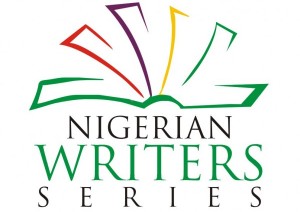
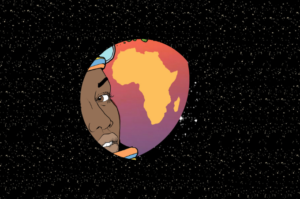
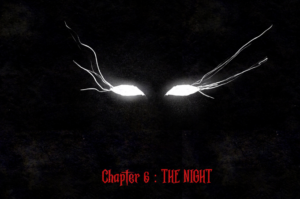
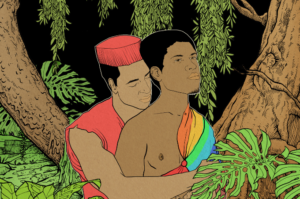
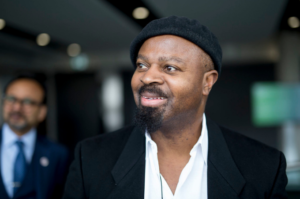

COMMENTS -
Reader Interactions